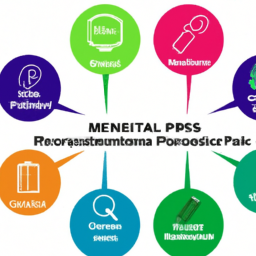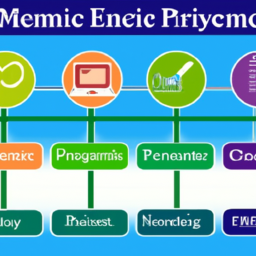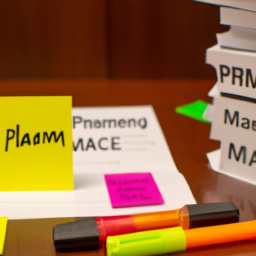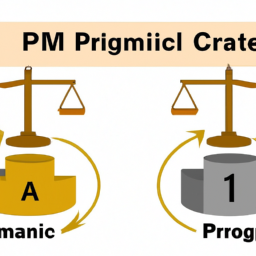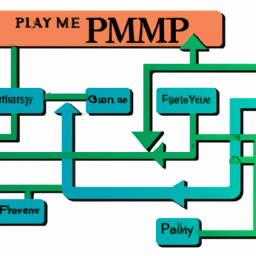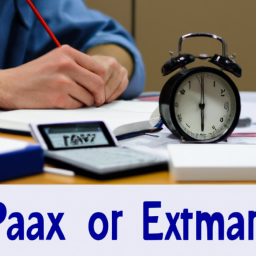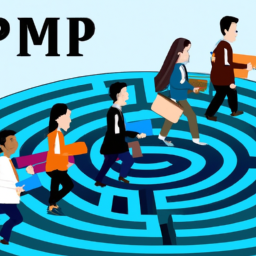Did you know that 80% of PMP exam takers believe in common misconceptions that can hinder their success?
In ‘The PMP Exam Mythbuster: Debunking Common Misconceptions,’ we aim to equip you with accurate information and valuable insights.
This article will explore the truth behind PMP exam prep courses, dispel myths surrounding pass rates, shed light on eligibility requirements, and debunk the notion of exam difficulty.
Prepare to challenge your assumptions and gain the knowledge you need to ace the PMP exam.
Key Takeaways
- Many people have misconceptions about the PMP exam, including thinking it is easier than it actually is and that memorizing the PMBOK Guide is sufficient to pass.
- Taking a reputable PMP exam prep course is important for adequate preparation, as it provides a comprehensive and organized approach, along with interactive learning tools.
- The actual pass rate for the PMP exam is around 60-70%, which is reasonable. Effective exam preparation strategies, such as studying the PMBOK guide, taking practice exams, and seeking guidance, can increase chances of success.
- Understanding the PMP exam eligibility requirements, including education, work experience, and project management training, is crucial before proceeding with exam preparation.
5 Common Misconceptions About the PMP Exam
You might think that the PMP exam is easier than it actually is, but there are common misconceptions about the difficulty level.
When it comes to studying strategies, many people believe that simply memorizing the PMBOK Guide will be sufficient to pass the exam. However, the PMP exam requires a deeper understanding of project management concepts and their practical application. It is important to focus on comprehending the material and practicing real-world scenarios through sample questions and simulations.
Additionally, some individuals underestimate the complexity of the exam format. The PMP exam consists of 200 multiple-choice questions that need to be answered within a four-hour timeframe. It is crucial to develop a time management strategy and practice answering questions within the given timeframe to ensure success.
Now that we have debunked these common misconceptions, let’s explore the truth behind PMP exam prep courses.
The Truth Behind PMP Exam Prep Courses
Start with a reputable PMP exam prep course to ensure you are adequately prepared for the test. Self-study can be effective, but a structured course provides a comprehensive and organized approach.
Here are some pros and cons of online PMP exam prep courses:
-
Pros:
-
Flexibility: You can study at your own pace and schedule, making it convenient for busy professionals.
-
Interactive Learning: Online courses often include quizzes, practice exams, and discussion forums to enhance understanding and engagement.
-
Cons:
-
Lack of Personalized Attention: Online courses may not provide individualized guidance and support like in-person classes.
-
Self-discipline: It requires self-motivation and discipline to stay on track and complete the course.
Dispelling Myths About PMP Exam Pass Rates
Dispelling myths surrounding the pass rates of the PMP exam helps to provide a clear understanding of the actual success rates. Many aspiring project management professionals believe that the pass rate for the PMP exam is extremely low, causing unnecessary anxiety and doubt.
However, it is important to note that the pass rate is not as daunting as it seems. According to recent statistics, the PMP exam has a pass rate of around 60-70%, which is quite reasonable.
To increase your chances of success, it is crucial to adopt effective exam preparation strategies and follow key tips for success. This includes thoroughly studying the PMBOK guide, taking practice exams, attending PMP exam prep courses, and seeking guidance from experienced professionals.
Understanding the PMP Exam Eligibility Requirements
Understanding the eligibility requirements for the PMP exam is essential for aspiring project management professionals. To help you visualize the process, here are the key points you need to know:
-
PMP Exam Application Process:
-
Complete the online application on the PMI website.
-
Provide details about your education, work experience, and project management training.
-
Pay the exam fee and submit the application for review.
-
PMP Exam Experience Requirements:
-
You need either a four-year degree (bachelor’s or global equivalent) and at least three years of project management experience, with 4,500 hours leading and directing projects, or
-
A secondary degree (high school diploma or global equivalent) with at least five years of project management experience, with 7,500 hours leading and directing projects.
Ensure you meet these requirements before proceeding with your PMP exam journey. Good luck!
Debunking the Myth of PMP Exam Difficulty
Contrary to popular belief, the difficulty of the PMP exam is often exaggerated. While it is true that the PMP exam can be challenging, with proper preparation and understanding of the exam structure, you can increase your chances of success. To help you in your PMP exam preparation, here are a few tips to keep in mind:
-
Familiarize yourself with the PMP Exam Content Outline: This will give you a clear understanding of the topics that will be covered in the exam.
-
Create a study plan: Set aside dedicated time each day to study and review the exam material. This will help you stay organized and focused.
-
Utilize study resources: There are numerous study materials available such as books, online courses, and practice exams. Utilize these resources to enhance your understanding of the concepts and gain confidence.
-
Practice, practice, practice: Take as many practice exams as possible to familiarize yourself with the exam format and identify areas where you need improvement.
Now, let’s debunk the myth about the high costs associated with the PMP certification. Contrary to the popular belief that obtaining a PMP certification is costly, the actual cost can be manageable if planned well. Here is a breakdown of the expenses involved:
| Expense | Cost |
|---|---|
| PMP Exam Fee | $555 for PMI members, $555 for non-members |
| PMI Membership | $129/year |
| Study Materials | Varies (books, online courses, practice exams) |
| Exam Preparation Course | Varies |
| Exam Retake Fee | $375 for PMI members, $375 for non-members |
Frequently Asked Questions
What Are the Advantages of Taking PMP Exam Prep Courses?
Taking PMP exam prep courses has numerous benefits. They provide you with the necessary knowledge and skills to excel in the exam and become a certified project management professional.
These courses cover all the important topics and concepts, ensuring you have a comprehensive understanding of project management principles. Additionally, they offer valuable resources, study materials, and practice exams to help you prepare effectively.
The importance of these courses cannot be overlooked as they significantly increase your chances of passing the PMP exam.
How Long Does It Typically Take to Prepare for the PMP Exam?
On average, it takes around 100-150 hours to prepare for the PMP exam. However, the actual time may vary depending on your prior knowledge and experience in project management.
To ensure you are well-prepared, it is recommended to use a combination of study resources such as PMP exam prep courses, study guides, practice exams, and online forums.
These resources will help you understand the exam content and practice answering different types of questions.
Are There Any Specific Educational Qualifications Required to Be Eligible for the PMP Exam?
To be eligible for the PMP exam, you need to meet certain educational requirements.
These qualifications include a secondary degree (high school diploma or equivalent) with at least five years of project management experience, or a four-year degree with at least three years of project management experience.
Additionally, you must have completed 35 hours of project management education.
These educational qualifications are necessary to ensure that candidates have the necessary knowledge and experience to successfully pass the PMP exam.
What Is the Passing Score for the PMP Exam?
The passing score for the PMP exam is not a fixed number. Instead, it is determined by a scoring algorithm that takes into account the difficulty of each question.
The PMP exam scoring criteria are based on a combination of the number of questions answered correctly and the level of difficulty of those questions. This means that the passing score can vary from one exam to another.
It is important to study and prepare thoroughly to increase your chances of achieving a passing score.
Can the PMP Exam Be Taken Online or Is It Only Available in Physical Test Centers?
The PMP exam can be taken either online or at physical test centers. With the option of remote proctoring, you can take the exam from the comfort of your own home or office.
If you prefer a traditional testing environment, physical test centers are also available. The choice is yours, based on what suits your preferences and circumstances best.
Rest assured, both options provide a secure and reliable way to take the PMP exam.
Conclusion
In conclusion, it’s important to separate fact from fiction when it comes to the PMP exam. By debunking common misconceptions, understanding the truth behind exam prep courses, and dispelling myths about pass rates, you can approach the exam with confidence.
Remember, eligibility requirements shouldn’t deter you from pursuing your PMP certification. While the exam may seem challenging, with the right preparation and dedication, you can conquer it like a seasoned mountaineer scaling the highest peak.
Stay focused, stay determined, and success will be within your reach.


